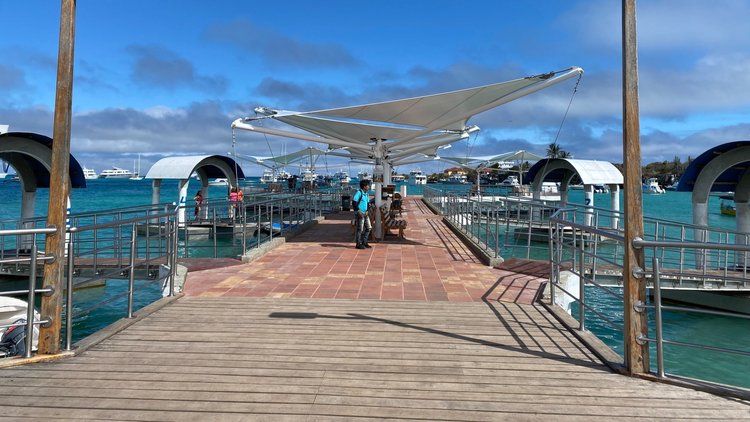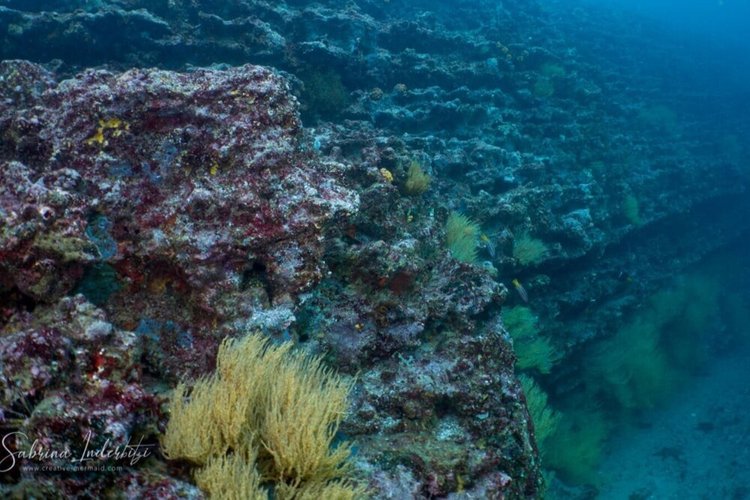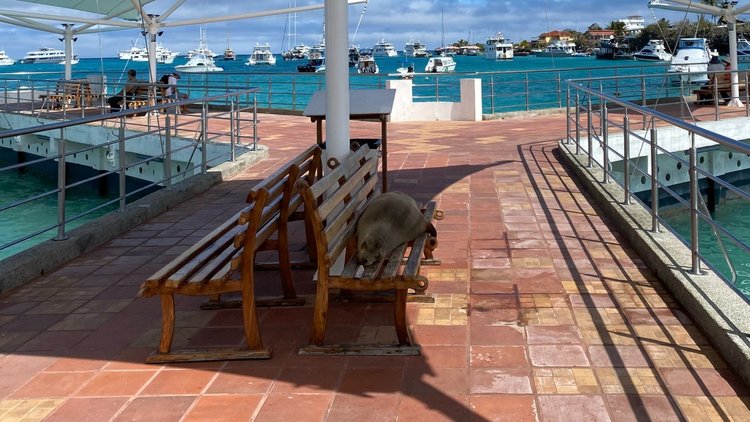Nortada’s eight guest arrangement for diving itineraries leverages encounters with marine wild life and enhances diver supervision, this renders in a safer and more personalized dive experience.
Exclusivity for 8 guests.
Humbolt and Panama seasons itinerary include visits to Wolf - Darwin Islands. Maximum capacity of 12 people only with special charters. Nortada offers 7 and 14 night itineraries.
Diving Itinerary
Snorkel tour
Carrion Point
El Derrumbe (Wolf)
La Banana (Wolf)
El Derrumbe (Wolf)
La Banana (Wolf)
Cape Douglas
Roca Blanca
Los Gemelos
Departure
| Friday | PM | Arrival |
|---|---|---|
| Snorkel Tour | ||
| Saturday | AM | Baltra NE |
| Carrion Point | ||
| PM | Cousin Rocks | |
| Sunday | AM | Shark Bay Point (Wolf) |
| El Derrumbe (Wolf) | ||
| PM | La Ventana Islet (Wolf) | |
| La Banana (Wolf) | ||
| Monday | AM | El Arenal (Darwin) |
| PM | El Arco (Darwin) | |
| Tuesday | AM | Shark Bay Point (Wolf) |
| El Derrumbe (Wolf) | ||
| PM | La Ventana Islet (Wolf) | |
| La Banana (Wolf) | ||
| Wednesday | AM | Vicente Roca Point |
| Cape Douglas | ||
| PM | Vicente Roca Point | |
| Thursday | AM | Cape Marshall |
| Roca Blanca | ||
| Friday | AM | Fausto Llerena Breeding Center |
| Los Gemelos | ||
| Departure |
ARRIVAL, SNORKEL TOUR AND DIVING BRIEFING
Meet at Passenger Pier at 12h30 in Puerto Ayora for lunch on board.
After lunch will be time for ATM visits, souvenir shopping, sightseeing of the local town and around 14h00 you will take a snorkeling tour in Santa Cruz island Bay.

CARRIÓN POINT / BALTRA NE / COUSIN ROCK
Usually starting at 6 am, one morning dive check is done at Carrión Point or the north-eastern portion of Baltra Island. First dive is followed by breakfast while Nortada refuels in Baltra. After refueling two hour navigation will take you to Cousin Rock for one or two dives.
Carrión Point and Baltra NE are considered “warm up” dives where dive procedures and equipment are tested and enforced or adapted.

WOLF ISLAND
Up to 4 dives during the day at Shark Bay Point, El Derrumbe, La Ventana Islet and La Banana; and one optional night dive during day 3 or day 5. Wolf Island is located at North West of the Archipelago.
Wolf is known as “The Meca of sharks”. Divers are usually able to swim alongside several species of sharks, dolphins, turtles, eagle rays and colorful schools of fishes.

DARWIN ISLAND
It is located at North West of the Archipelago. Up to 4 dives are done on this day.
Darwin is considered as one of the best places to dive over the world. Divers are usually able to see several species of sharks, dolphins, turtles, eagle rays and colorful schools of fishes. Schooling hammer head sharks and whale sharks are the highlights of dives at Darwin’s Arch.

WOLF ISLAND
Up to 4 dives during the day at Shark Bay Point, El Derrumbe, La Ventana Islet and La Banana; and one optional night dive during day 3 or day 5.
The marine life of Wolf Island includes: schooling hammerhead sharks, occasionally whale sharks, as well as green turtles, manta rays and other pelagic fish. Birdlife on the island is abundant with frigatebirds, red-footed boobies, and vampire finches.

CAPE DOUGLAS / VICENTE ROCA POINT
One or two dives are done in Cape Douglas followed by a short transit of about 90 minutes to Vicente Roca Point for one or two dives. Up to 4 dives are done on this day.
Isabela and Fernandina dive sites are where Flightless Cormorants, Galapagos Penguins, Marine Iguanas and several other endemic species can be seen consistently.

CAPE MARSHALL / ROCA BLANCA
Located in the northeast coast of Isabela, these volcanic walls are sparsely covered with black coral bushes.
During January to May, divers usually enjoy encounters with Giant Mantas; schools of fish, including the endemic black-stripped Salema, white- tip reef sharks, Galapagos sharks and some hammerheads.

PUERTO AYORA / TRANSFER OUT
Breakfast and check out from Nortada followed by a land visit to Fausto Llerena Breeding Center and Charles Darwin Research Station.
The breeding center land visit will provide with an opportunity to learn about the breeding programs for giant tortoises and land iguanas. If required, a transfer to the airport with a visit to the tortoises in the wild can be arranged for an additional fee.


After lunch will be time for ATM visits, souvenir shopping, sightseeing of the local town and around 14h00 you will take a snorkeling tour in Santa Cruz island Bay.
A welcome cocktail and dinner will be served on board, later there will be a briefing about diving and security practices. Nortada will depart at midnight with destination to Carrión Point.

Carrión Point and Baltra NE are considered “warm up” dives where dive procedures and equipment are tested and enforced or adapted.
Cousin Rock is one of the most popular dive sites in the central islands. The islet is formed by volcanic tuff.

Wolf is known as “The Meca of sharks”. Divers are usually able to swim alongside several species of sharks, dolphins, turtles, eagle rays and colorful schools of fishes.
Wolf also offers an opportunity to explore the erosion underwater caverns and tunnels. Meals are scheduled around diving, usually with one dive before breakfast and one dive after lunch. The better part of the night is spent in the anchorage and transit to Darwin starts in the early AM of day 4.

Darwin is considered as one of the best places to dive over the world. Divers are usually able to see several species of sharks, dolphins, turtles, eagle rays and colorful schools of fishes. Schooling hammer head sharks and whale sharks are the highlights of dives at Darwin's Arch.
Meals are scheduled around diving, usually with one dive before breakfast and one dive after lunch. Transit back to Wolf and dinner. Navigation is roughly 20 nautical miles / 2 hours.

The marine life of Wolf Island includes: schooling hammerhead sharks, occasionally whale sharks, as well as green turtles, manta rays and other pelagic fish. Birdlife on the island is abundant with frigatebirds, red-footed boobies, and vampire finches.
Meals are scheduled around diving, usually with one dive before breakfast and one dive after lunch. Navigation to Cape Douglas will be 100 nautical miles and can be rough at times.

Isabela and Fernandina dive sites are where Flightless Cormorants, Galapagos Penguins, Marine Iguanas and several other endemic species can be seen consistently.
The highlight in Cape Douglas are the marine iguanas feeding underwater but red lipped batfish, horn sharks and Mola-Mola plus different types of Baleen Whales, are usually sighted during this day.

During January to May, divers usually enjoy encounters with Giant Mantas; schools of fish, including the endemic black-stripped Salema, white- tip reef sharks, Galapagos sharks and some hammerheads.
Up to 4 dives are done on this day.

The breeding center land visit will provide with an opportunity to learn about the breeding programs for giant tortoises and land iguanas. If required, a transfer to the airport with a visit to the tortoises in the wild can be arranged for an additional fee.
Diving Features
Tenders for diving
Nitrox Available
Rinse hoses
DIN Adaptors
Dive deck
Separate rinse for u/w camera
Shaded diving deck
- Tenders for diving
- Nitrox Available
- Rinse hoses
- DIN Adaptors
- Dive deck
- Separate rinse for u/w camera
- Shaded diving deck
Diving FAQ
-
Our normal itinerary is 8 day / 7 night on board.
15 days itineraries available based on a 2 week charter rate plus a USD 1,500 itinerary change surcharge.
-
Due to strong currents, varying visibility and cold water, you must have a PADI advanced certification and an average of 50 dives to dive in the Galapagos Islands.
-
There are 20 dives per week and we will provide lead weight for each passenger.
We have one optional night dive allowed in selected locations only.
-
We recommend a 5mm wetsuit, 5mm booties and 2mm gloves. Diving computers are mandatory equipment for each dive.
-
One dive guide for seven divers and all full departures (8 to 12 passengers) are run with two dive masters in two tenders.
An increased supervision ratio also makes diving safer by accommodating different levels of experience, air consumption and interests.
-
Children from 15 years old are welcome as long as they meet the minimum requirements for diving and when accompanied by an experienced diving parent.
Dive into paradise!
Discover one of the most acclaimed seascapes in the world.








